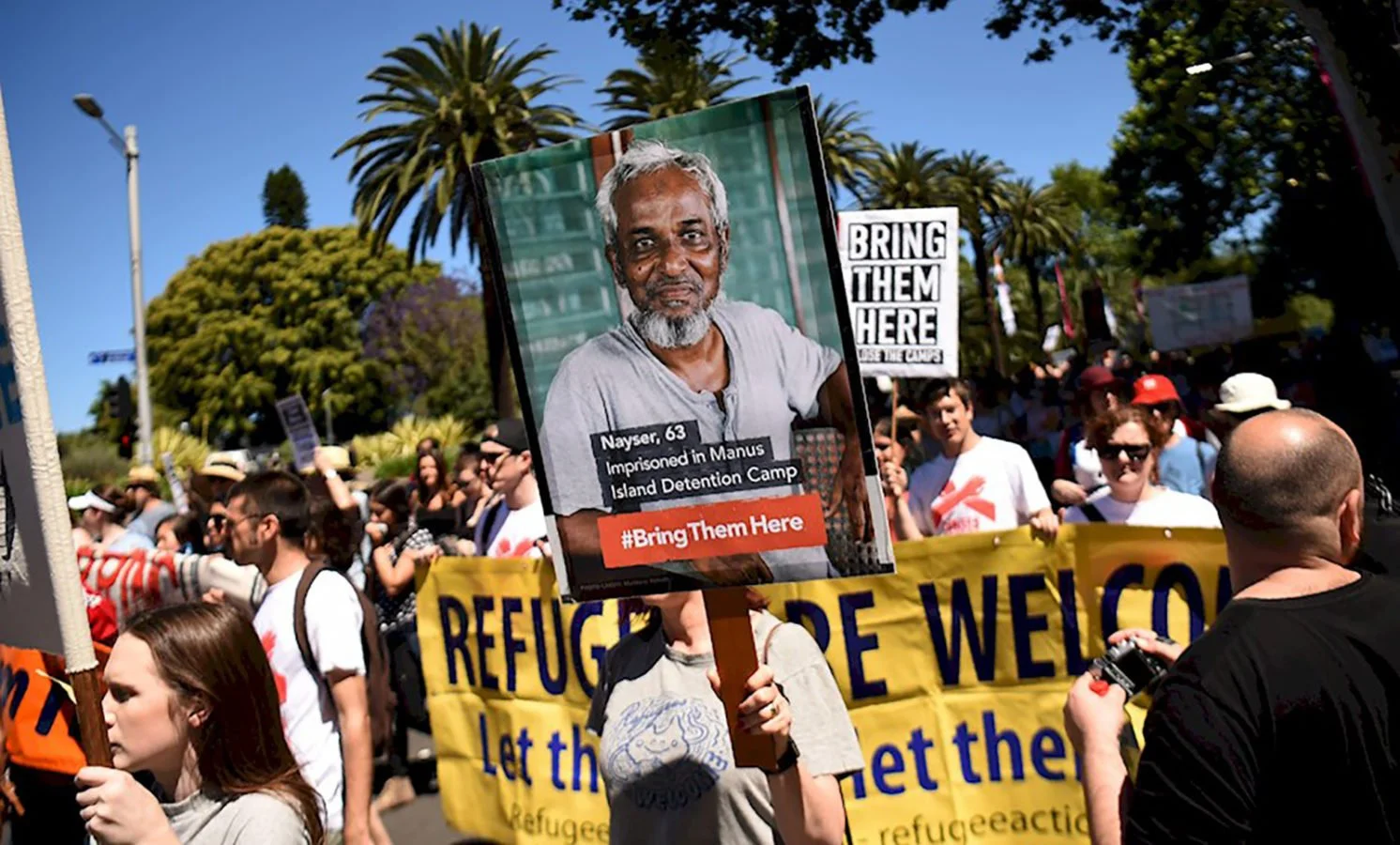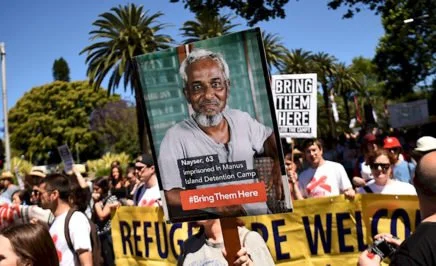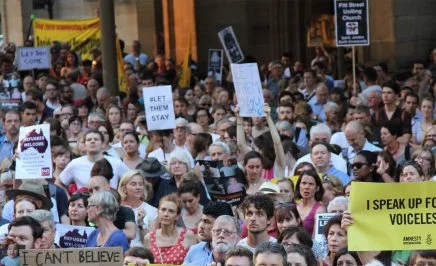On a day that marks four long years of the Australian Government’s deliberately abusive policies Amnesty International is pleading for an immediate plan to guarantee the safety of the two thousand people trapped on Nauru and Manus Island.
“For four years consecutive Australian governments have chosen to force people seeking safety to suffer in offshore detention,” said Graham Thom, Refugee Coordinator at Amnesty International.
“While the agreement with the USA may offer a lifeline for some, the Australian Government’s ‘solution’ is expecting other countries to clean up the mess it created by these cruel policies, and it won’t be enough to ensure safety for everyone.”
Vigils, organised by a diverse range of community organisations, are being held across the country, in every state and territory, as concerned Australians gather to highlight the ongoing plight of so many people who are now entering their fourth year of indefinite detention in the offshore camps.
Over the last four years the evidence has stacked up on the danger, abuse and suffering the Australian Government’s offshore detention regime is causing.
“For four years consecutive Australian governments have chosen to force people seeking safety suffer in offshore detention.”
Graham Thom, Refugee Coordinator at Amnesty International.
“Enough is enough, the truth is out in plain sight, there have been multiple human tragedies, six people have died and report after report has highlighted the abuse, the self harm, the violence that is a daily reality for people trapped in offshore detention,” said Graham Thom.
“The evidence is clear, the Australian Government has designed a deliberately abusive system, intended to harm people. Such a callous indifference to the safety and well-being of refugees cannot continue any longer.”
Marking the four year anniversary of then Prime Minister Kevin Rudd’s “Regional Resettlement Arrangement” with Papua New Guinea (PNG) Amnesty International is calling on the Australian government to take action immediately.
“What’s important to realise is that it doesn’t have to be this way, the Australian Government can choose to let people rebuild their lives in safety,” said Graham Thom.
“This is a time for common sense and compassion. The camps must be evacuated immediately, all those we have sent to Nauru and Manus must be taken to Australia, it’s the fairest and quickest way to prevent another tragedy.”
“The next step is for Australia to immediately invest humane solutions – that both reduce deaths at sea and eliminate abuse – one shouldn’t come at the expense of the other and it’s about time the Australian Government stops ignoring this.”
More information on the vigils can be found at communityrun.org, australianrefugeeactionnetwork.wordpress.com
Timeline: Four years of abuse
| 19 July 2013: | Then Prime Minister Kevin Rudd announces a new “Regional Resettlement Arrangement” with Papua New Guinea (PNG) so Australia can buy its way out of its ethical responsibilities. From this day forward anyone seeking protection and safety in Australia who arrive by boat will be forcibly transferred to PNG for processing and, if they are found to be refugees, be permanently settled there. |
| 19 July 2013: | The announcement causes distress amongst the people warehoused in detention in Nauru with peaceful protests escalating into violence. |
| 3 August 2013: | The Australian Government signs a new memorandum of understanding with Nauru similar to its Regional Resettlement Arrangement with Papua New Guinea. |
| 17 February 2014: | 23-year-old Reza Berati is murdered, and over 60 others injured, some of them seriously, on Manus Island. Numerous witness reports state Reza Berati was attacked by a group of G4S staff and at least one local staff member employed by The Salvation Army. Several eyewitnesses reported that one attacker picked up a large rock and hit Reza Berati on the head with it several times. |
| 5 September 2014: | Hamid Khazaei, who was only 24 years old dies from a sepsis infection three weeks after he cut his foot at the detention centre on Manus Island. Inadequate medical care and delayed medical evacuation were later reported to have let to to Mr Khazaei’s death. |
| 26 September 2014: | The Australian and Cambodian governments sign a deal under which people on Nauru who are found to be refugees are to be resettled in Cambodia. This second deal again allows Australia to buy its way out of its ethical responsibilities. |
| 18 November 2014: | Then Immigration Minister Scott Morrison announces that asylum seekers who have registered with the United Nations High Commissioner for Refugees in Indonesia after 1 July 2014 will no longer be able to be resettled under Australia’s humanitarian program. |
| 5 December 2014: | A bill passes both Houses providing the Immigration Minister with the power to detain people at sea (including outside Australia’s jurisdiction) and send them to other countries or vessels, even without the permission or knowledge of those countries. |
| 20 March 2015: | The report from independent review into allegations of sexual abuse on Nauru is released detailing reports of women being raped and allegations of children being sexually assaulted. |
| 20 March 2015: | A boat carrying 46 Vietnamese asylum seekers is intercepted by Australia. Its passengers are held at sea for nearly a month and undergo “enhanced screening” before being returned to Vietnam on 18 April. |
| 28 May 2015: | Thousands of men, women and children seeking protection are abandoned at sea in what is now known as the Andaman Sea ‘boat crisis’. Regional governments eventually agree to allow the boats to land but then Prime Minister Tony Abbott’s callous response to Australia offering safety is “nope, nope, nope”. |
| 4 June 2015: | Nine months after the $55 million Cambodia deal, four refugees arrive in Phnom Penh from Nauru. All of these people subsequently choose to return to their countries of origin, despite the fact that all four were found to have well-founded fears of persecution. |
| 1 July 2015: | The Australian Border Force Act takes effect making it a crime punishable by two years’ imprisonment for medical professionals, educators and others contracted by the Australian Government to speak about what they see in offshore detention. |
| 5 October 2015: | The Nauruan Government announces that the Regional Processing Centre will operate under an open centre arrangement. |
| 29 October 2015: | Amnesty International Australia publishes a report revealing evidence that Australian officials paid boat crews to return people seeking asylum to Indonesia. |
| 8 November 2015: | Fazel Chegeni, an Iranian refugee detained in Christmas Island Detention Centre, is found dead after escaping the centre. |
| 19 February 2016: | Australia again rejects the standing offer from New Zealand to accept 150 people from Nauru or Manus Island, failing to provide sensible, durable solutions for the people trapped there. |
| 21 February 2016: | Baby Asha, a one-year old who was transferred along with her family from Nauru to Brisbane Lady Cilento Children’s hospital for medical treatment is released into community detention. This came after the doctors at the hospital refused to discharge Asha after the completion of her treatment, fearing she would be transferred back to Nauru. |
| 23 March 2016: | At the Ministerial Bali Process meeting a declaration was released (the Bali Declaration) which for the first time identified the need to provide protection to refugees in the region. |
| 15 April 2016: | A refugee in Nauru is convicted of attempted suicide, which was recognised as a crime in Nauru at the time. |
| 26 April 2016: | PNG’s Supreme Court rules that the transfer and detention of asylum seekers on Manus Island is illegal. |
| 26 April 2016: | Omid Masoumali, a refugee living in Nauru for three years sets himself on fire. After more than 24 hours he is medically evacuated to Australia where he dies in a hospital in Brisbane on Friday 29 April 2016. |
| 2 May 2016: | A young Somali refugee living in Nauru sets herself on fire. She is later flown to Australia by air ambulance suffering burns to 70% of her body. |
| 5 May 2016: | A boat with 12 Sri Lankan people seeking asylum who were intercepted by Australian authorities earlier in the week are screened at sea before being returned to Sri Lanka. They were reportedly arrested on arrival at Colombo airport. |
| 10 May 2016: | The Federal Court rules the Government must provide a woman, raped on Nauru, access to a safe and legal termination. |
| July 2016: | Amnesty International’s Senior Director for research visits Nauru where she finds a system of deliberate abuse hidden behind wall of secrecy. |
| 10 August 2016: | The Guardian releases the Nauru files – thousands of leaked incident reports from Nauru detail assaults, sexual abuse and child abuse. |
| 19 September: | UN Global Summit for Refugees and Migrants in New York misses opportunity to find solutions to the global refugee crisis. |
| 17 October 2016: | In a new report ‘Island of Despair’: Australia’s “processing” of refugees on Nauru Amnesty International find that the conditions to which refugees and people seeking asylum on Nauru are subjected amounts to torture. |
| 30 October 2016: | Immigration Minister Peter Dutton tries to introduce legislation to ensure anyone taken to Nauru and Manus and then resettled anywhere in the world, would never be able to come to Australia. |
| 13 November 2016: | The Government takes an extreme step in shirking responsibility by announcing an agreement with the United States for some of the refugees in offshore detention to be settled in the US via a process administered by the UNHCR. |
| 25 November 2016: | Malaysia begins work on a pilot scheme to allow refugees from Myanmar’s persecuted Rohingya minority to work in the country, which in turn reduces number of people forced to take dangerous journeys in search for a safe place to rebuild their lives. |
| 24 December 2016: | Faysal Ishak Ahmed collapses at the Manus detention centre. He dies on Christmas Eve. |
| 31 December 2016: | The Indonesian President issues a Presidential Decree for refugees which for the first time provides people seeking asylum and refugees in Indonesia with a more formal legal status. |
| 14 April 2017: | PNG Soldiers fire directly into the Manus Island detention centre putting lives at risk. 9 people are injured. No one is held accountable. |



